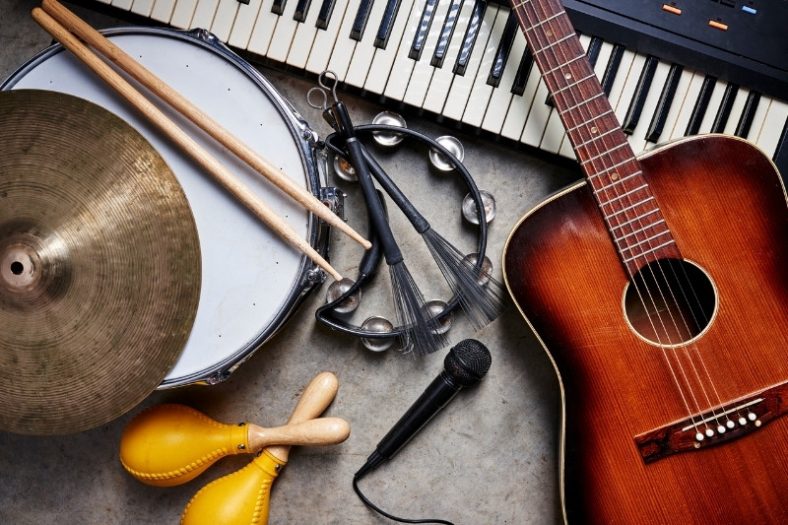10 Benefits of Learning to Play a Musical Instrument

Learning to play an instrument can improve mental performance and concentration. It can also boost your creativity and personal expression. Additionally, it helps reduce stress and build confidence.
Many children, at a certain age, have some interest in music or playing an instrument. Parents, however, may have some hesitations about its necessity and effect.
Extracurricular activities aid the growth and development of a child. This includes their abilities, interests, and passions. There are several advantages to learning to play an instrument. This includes increased self-confidence, social skills, and improved memory.
Here are 10 benefits of playing an instrument.
Contents
1. Improves Mental Performance
Studies show that playing a musical instrument improves mental health as well as physical health. This is because the activity has a potent impact on mood.
The act of playing an instrument might be considered a kind of creative self-expression. Children can easily express their feelings, establish self-confidence, and make their voices heard.
Today, parents and educators find it difficult to help young people cope with the pressures of modern life. They can essentially create a channel for previously untapped energy to be released.
Playing an instrument would also bring to life all the emotions that are buried. According to recent studies, a good deal of teenagers have either experienced or know someone who has had a mental health condition.
You don’t even have to be a specialized instrumentalist to reach this ability. You can elevate feelings of vigor, enthusiasm, and joy. At the same time, you lower feelings of sadness, tension, exhaustion, and frustration. All this occurs because music serves as an outlet for suppressed sentiments and emotions.
All you have to do is figure out a way to communicate your feelings and thoughts through the movement of your hands.
2. Better Concentration
Learning a musical instrument improves one’s cognitive abilities. The way you hold the instrument, the right posture, sound quality, pitch, pace, note duration, and rhythm are all important considerations while learning to play a musical instrument.
Almost every region of your brain is put to action when you try to put all these things together. When you develop your technique, there are even higher-level events to play the instrument. When playing in a group, learning to play in unison is a tough but essential element.
An increased motor function improves concentration, according to research, that focuses on musical training.
3. Refines Your Motor Skills
Almost all our motor abilities become automatic by the time we reach adulthood. Hand-eye coordination is a skill that we all develop. When we speak or write, we don’t have to pay attention to the details and try to remember how to do it.
The act of reading musical notation on a sheet forces your subconscious mind to unconsciously transform notes into certain motor patterns. This also includes breathing and rhythm in the process. It takes a great deal of hand-eye coordination to develop the skill of playing an instrument.
For someone who lost the ability to move their body because of an injury, playing an instrument is a great method of regaining that ability. Musical treatments in physical and therapeutic settings have recently begun to gain popularity.
4. Better Expression
Because it’s your instrument, you have complete freedom to improvise. The better your skill level, the better your ability to express yourself musically. Just like an artist might paint his or her feelings using colors, a musician can perform a piece with feeling.
This is a stress-relieving method and might be an excellent treatment option. In reality, studies show that music therapy is effective in treating a variety of illnesses. Autism, dementia, and anxiety are some that fall under this umbrella.
Find a method to convey oneself through hand gestures, emotions, and ideas and you’ll be fine. As a result, previously repressed emotions will begin to awaken. All this occurs because music acts as a channel for releasing suppressed emotions and sensations.
There is no other way to express oneself via music. Anyone’s creative side may flourish when given the chance to share their ideas. People become more aware of their selves because of this. There are many ways to grow as a person, but one of the best is to play an instrument.
5. Relieves Stress
When playing an instrument, you’ll need to inhale and exhale large amounts of air even though you don’t play a wind instrument. You’ll also need to pay attention to your posture. Improving your respiratory system changes the functions of your brain and slows your heart rate. This is why playing a musical instrument may put a space between you and your thoughts and worries.
Learning a musical instrument may be one of the most important things you can do for your stress level. It’s very similar to meditation when you practice a musical instrument. You have to be very focused and do the same thing over and over again. Practicing a musical instrument uses all parts of your brain and hones your focus.
Also, in case you suffer from anxiety or stress, stage fear may show up. This shouldn’t be in any way discouraging. Performing on stage helps shed these feelings through personal experience.
To be able to play in front of people is one of the reasons you practice your instrument so often. If you’re prepared and know what you’re doing, it’s a lot simpler to stand up and perform in front of an audience.
Stage fear is easier to overcome the more you perform in front of others. When you perform better, you start to feel less stress and anxiety as your memory shifts about how you feel with and in front of people.
6. It Builds Confidence
It’s easier to express yourself when you play an instrument. Starting with music tutors, and parents, and progressing to groups and concert audiences, youngsters are likely to begin performing in front of people. Playing in public can give youngsters the self-assurance they need to show their work.
As a second thing, they’ll be hit with a wave of dopamine. There is a certain satisfaction that comes from understanding a musical instrument. Especially when you manage to perfect a piece that has been a source of frustration, it’s indescribably satisfying. This makes us think that we can do the things we want to do. When this happens a lot, our brain starts to change.
They can do this while they work on other skills that will help them later in life. Your kids will have a chance to reach their goals if they practice a musical instrument. This will help them become more confident.
7. Improved Time Management
When learning, you’ll need to practice regularly. It’s hard to figure out how to schedule practice into a busy life and actually stick with it. If you manage this, you will gain higher time management and organizational abilities.
When it comes to practice time, quality is more important than quantity. Consistency and routine are also needed.
To become proficient, you’ll need to master time management and organization skills. As you progress, you will learn how to better manage your practice time and set new tasks to focus on to get the most out of those practice sessions.
8. Better Social Life
Playing a musical instrument may broaden our social boundaries in two ways. First, by introducing us to other musicians with whom we have the same interest. You must learn to work with others in a band or orchestra to succeed. And second, by cultivating our capacity for empathy and emotional maturity via music. The ability to play in unison is essential to a group’s ability to produce high-quality music.
Playing a musical instrument necessitates a collaborative effort with others. This shouldn’t be a scary concept. Because the chance of understanding and empathizing with other people is much higher when you can connect with their music. This form of emotional growth improves our social interactions as well.
9. More Creative
Music is something that only humans can create. Also, instrument players share this power while interpreting music. While performing and interpreting music, your brain is stimulated in new ways.
Learning an instrument is like learning a completely new language. Playing an instrument requires coordination of many parts of the brain including the creative side. You need to internalize the entire structure and your instrument’s part in the way that it’s written.
One of the most creative activities available is playing and improvising music in real-time. This activity throws the brain into a flow.
10. It’s Fun
Music and all the events that involve music already give people good vibes. Because there is “sharing” in music no matter if you only listen to it or if you interpret it. This is why playing an instrument is much more than trying to achieve something. It boosts your mood even when you play a sad song because there is interaction even when you play by yourself.
Summary
There are several advantages to learning an instrument, regardless of your age or ability level. First, it’s a mood enhancer. Music activates the brain’s pleasure regions and reward centers in every way imaginable.
As a result, it impacts your well-being and health. We feel happy, relaxed, and more confident. These things can work in a positive chain effect where we start to think better, move better, and concentrate better.
Additionally, we naturally improve our time management skills, social skills, and creativity. And it’s all thanks to the practices that require discipline.





